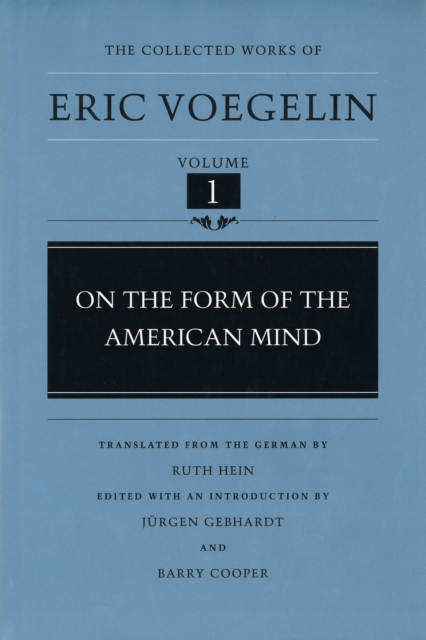On the Form of the American Mind (Cw1): Volume 1

On the Form of the American Mind (Cw1): Volume 1
In 1924, not quite two years after receiving his doctorate from the University of Vienna, Eric Voegelin was named a Laura Spelman Rockefeller Memorial Fellow and thus given the opportunity to pursue postdoctoral studies in the United States. For the next twenty-four months, Voegelin worked with some of the most creative scholars in America and at several of the country's great universities, an experience that undoubtedly influenced his scholarly and personal perspectives throughout his life. A more immediate result was the publication in 1928 of On the Form of the American Mind, the young philosopher's first major work, in which his acute perceptions and analyses combine with a conceptual vocabulary struggling to find its own coherence and form.
Voegelin begins his inquiry into the form of the American mind with a complex discussion of the concepts of time and existence in European and American philosophy and continues with an extended interpretation of George Santayana, a study of the Puritan mystic Jonathan Edwards, a presentation on Anglo-American jurisprudence, and a consideration of the historian, economist, and political scientist John R. Commons (Voegelin was particularly interested in Commons' views on the mental, political, social, and economic aspects of democracy in modern urban and industrial America). Although admitting that this diversity of themes seems only loosely connected," Voegelin demonstrates the actual overall unity of these various subjects: each concerns linguistic expressions of a theoretical nature.Analysis of On the Form of the American Mind indicates that Voegelin integrated the approaches of Lebensphilosophie into what Georg Misch called the "philosophical combination of anthropology and history," which characterized contemporary trends within the discourse of the Geisteswissenschaften and finally resulted in a theoretical paradigm of philosophical anthropology.
Jürgen Gebhardt and Barry Cooper provide access to this brilliant study with their two-part introduction. The first part considers On the Form of the American Mind in the context of methodological debates ongoing in Germany at the time Voegelin was writing the book; the second describes Voegelin's American experience and compares his work with similar studies written during the post-World War I period.
PRP: 566.40 Lei
Acesta este Prețul Recomandat de Producător. Prețul de vânzare al produsului este afișat mai jos.
509.76Lei
509.76Lei
566.40 LeiLivrare in 2-4 saptamani
Descrierea produsului
In 1924, not quite two years after receiving his doctorate from the University of Vienna, Eric Voegelin was named a Laura Spelman Rockefeller Memorial Fellow and thus given the opportunity to pursue postdoctoral studies in the United States. For the next twenty-four months, Voegelin worked with some of the most creative scholars in America and at several of the country's great universities, an experience that undoubtedly influenced his scholarly and personal perspectives throughout his life. A more immediate result was the publication in 1928 of On the Form of the American Mind, the young philosopher's first major work, in which his acute perceptions and analyses combine with a conceptual vocabulary struggling to find its own coherence and form.
Voegelin begins his inquiry into the form of the American mind with a complex discussion of the concepts of time and existence in European and American philosophy and continues with an extended interpretation of George Santayana, a study of the Puritan mystic Jonathan Edwards, a presentation on Anglo-American jurisprudence, and a consideration of the historian, economist, and political scientist John R. Commons (Voegelin was particularly interested in Commons' views on the mental, political, social, and economic aspects of democracy in modern urban and industrial America). Although admitting that this diversity of themes seems only loosely connected," Voegelin demonstrates the actual overall unity of these various subjects: each concerns linguistic expressions of a theoretical nature.Analysis of On the Form of the American Mind indicates that Voegelin integrated the approaches of Lebensphilosophie into what Georg Misch called the "philosophical combination of anthropology and history," which characterized contemporary trends within the discourse of the Geisteswissenschaften and finally resulted in a theoretical paradigm of philosophical anthropology.
Jürgen Gebhardt and Barry Cooper provide access to this brilliant study with their two-part introduction. The first part considers On the Form of the American Mind in the context of methodological debates ongoing in Germany at the time Voegelin was writing the book; the second describes Voegelin's American experience and compares his work with similar studies written during the post-World War I period.
Detaliile produsului










